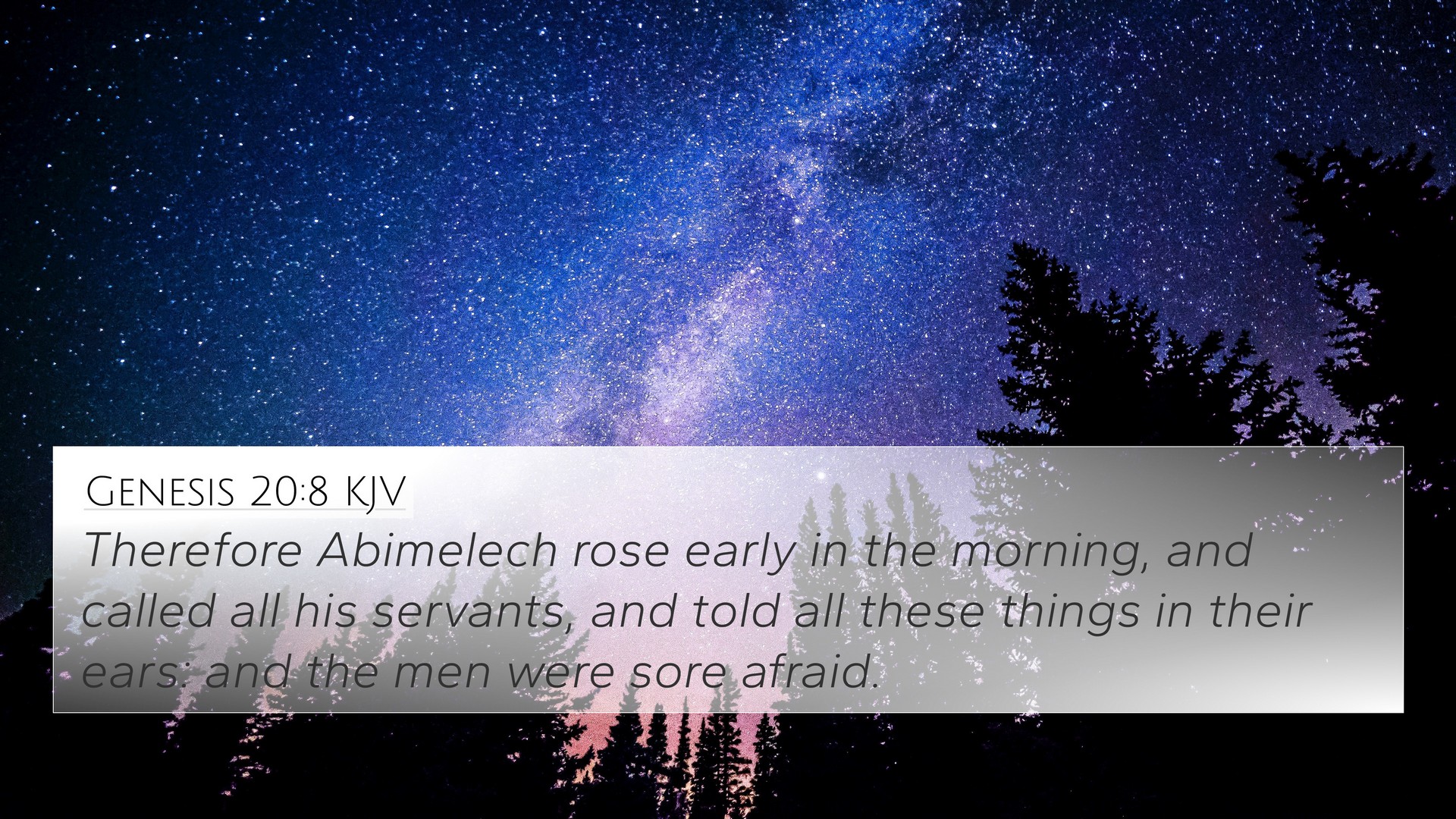Meaning and Interpretation of Genesis 20:8
Genesis 20:8 states, "So Abimelech rose early in the morning and called all his servants and told all these things in their hearing; and the men were very much afraid." This verse encapsulates a moment of deep reflection and consequence following divine revelation, underlining themes of fear, responsibility, and God's sovereignty.
Contextual Background
The story unfolds in the land of Gerar, where Abraham, due to fear of being killed, presents Sarah as his sister. This act leads Abimelech, the king, to take Sarah into his harem, unaware of her true identity and the divine intention at play. The Lord intervenes by revealing the truth to Abimelech through a dream, which prompts a series of events that highlight the moral dimensions of the narrative.
Interpretation of Genesis 20:8
This verse captures Abimelech's immediate reaction to the divine warning he received. The solemnity of his response illustrates several key themes:
- Divine Authority: The dream signifies God's command over kings and nations. Abimelech's recognition of the dream's seriousness reflects a humility before divine authority.
- Moral Fear: The fear expressed by the men underlines a broader fear of God's judgment and disobedience. It invokes the theme that recognizing God's power can lead to a profound sense of accountability.
- Human Responsibility: Abimelech's actions embody the complexity of human morality. His intention was not malicious, yet the consequences of the deception compelled him to confront deeper ethical considerations.
Thematic Connections
This verse ties into broader Biblical themes and inter-Biblical dialogues:
- Fear of God: This resonates with Proverbs 1:7, "The fear of the Lord is the beginning of knowledge." Abimelech's fear mirrors the proper response to divine revelation.
- Divine Protection: Reflects the theme found in Psalm 121:7-8, where God watches over His people and honors their integrity.
- Human Fallibility: Connects with Romans 3:23, highlighting the universal nature of sin and moral failure.
- Revelation through Dreams: This aligns with Joseph's dreams in Genesis 37 and the prophetic dreams in Matthew 1:20, illustrating a continuity of divine communication.
- Divine Intervention: Seen again in Exodus 3:8, where God intervenes in human history for His redemptive purposes.
Cross-Referencing Related Verses
Genesis 20:8 relates closely to several other Biblical verses, enhancing the understanding of its message. Here are key cross-references:
- Genesis 12:17: God's intervention in Abraham's earlier sojourn in Egypt.
- Genesis 26:9-11: A similar theme of deception arises with Isaac and Rebekah.
- Proverbs 16:9: Indicates a mindset that acknowledges God’s direction in human affairs.
- Matthew 2:12-13: The guidance of dreams in protecting Jesus aligns with God’s protective hand over the innocent.
- Luke 1:74-75: Speaks to the faithfulness of God in preserving His people.
- 1 Peter 2:9: Emphasizes the chosen nature of God’s people in relation to His broader plan.
- Hebrews 11:8: Reflects Abraham's faith, establishing a context of trust in God’s promises despite circumstances.
Connection with Other Scripture Themes
Understanding Genesis 20:8 requires the engagement with broader themes throughout scripture:
- The Covenant Relationship: The narrative encapsulates the tension between God's promises and human actions, urging believers to embrace integrity.
- God’s Sovereignty: The unfolding events illustrate God directing history according to His purposes, reaffirmed in Romans 8:28.
- Ethics in Leadership: Explores the moral responsibilities of leaders in light of divine authority, echoing 1 Timothy 2:1-2.
Practical Applications for Believers
The insights derived from Genesis 20:8 offer significant implications for contemporary believers:
- Accountability to God: Believers are reminded of the need to live in a manner that respects God’s moral order.
- The Importance of Honesty: Fostering truthfulness in relationships, akin to the call for integrity in Ephesians 4:25.
- Reverence for Divine Authority: Encouraging a life characterized by respect for God's guidance and directions.
Conclusion
Genesis 20:8 encompasses a profound narrative of fear, moral consequence, and divine sovereignty. Its connections to other scripture enhances our understanding of these themes, emphasizing the unity of Biblical teachings. The verse illustrates the importance of inter-Biblical dialogue, where linking Bible scriptures opens pathways to deeper spiritual insight and practical application.
Engaging in cross-referencing Biblical texts presents believers with tools for understanding scripture in depth. Use a bible concordance or bible cross-reference guide to explore thematic Bible verse connections. Such practices will enrich your Bible study and illuminate how different parts of the Bible speak to each other, enhancing both knowledge and faith.


